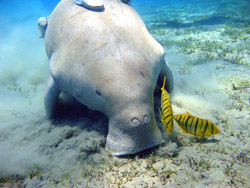
Photo by Flickr user <a href="http://www.flickr.com/photos/38504374@N02/3610811030/">flickkerphotos</a> under Creative Commons.
Despite what a recent PETA ad would have you believe, some vegetarians are fat. Take, for example, the herbiverous and tubby Dugong. Dugongs have long been hunted for their fat, meat, and oil and they’re easy targets: they swim slowly through shallow waters munching on seagrass like a cow on pasture. In fact, they’re often called seacows. Though dugongs are protected in the US under the Endangered Species Act, some are still killed by motorboat collisions and poachers.
There are about 100,000 dugongs left, the majority in Australian waters. Like their relative the elephant, dugongs can grow huge: up to 11 feet in length and 2,000 pounds in weight. The shy animals can only stay underwater for about 6 minutes, and sometimes “stand” on their tail flukes to push their heads to the surface, holding their front flippers in front of them like arms. This activity, combined with the dugong’s distinctive head and body shape, not to mention its “conspicuous” nipples, is thought to have inspired lovelorn sailors’ tales of mermaids and sirens. Accordingly, dugongs (along with manatees) belong to the order Sirenia
The dugong’s long lifespan (70 years) and a slow reproduction rate (one calf every 3 to 7 years) makes it less able to adapt to environmental changes than smaller, more fertile animals like squid or jellyfish. However, unlike some other animals, the dugong has no set breeding period and can mate year round. Although unusual now, there used to be “herds” of hundreds of dugongs, who would segregate cream-colored young in a “nursery” while blue-grey adults foraged for food. Now, most dugong groups sighted have only 6 or so members. Unfortunately (or fortunately, depending on how you look at it) dugongs are rarely found in captivity, but you can “adopt” your own dugong via the World Wildlife Fund here.
Follow Jen Phillips on Twitter.











